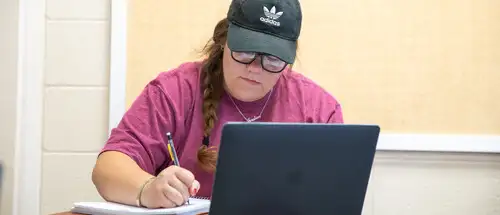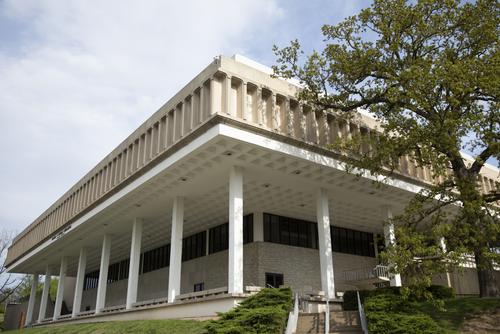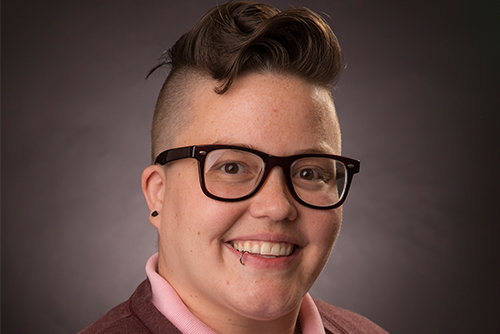Mental Health Counseling Master's Degree
Continue to main content
Mental Health Counseling Master's Degree Map
Explore the courses you'll need to complete your master's degree in counseling.
Salaries & Careers With a Master's Degree
-
$65k
Mental Health Counselor
According to the Bureau of Labor Statistics, the mean annual salary for a mental health counselor is $65,100.
-
$94k
School Psychologist
According to the Bureau of Labor Statistics, the mean annual salary for a clinical, counseling, and school psychologist is $93,610.
-
$71k
School and Career Counselors
According to the Bureau of Labor Statistics, the mean annual salary for a school or career counselor is $71,520.
With a master’s degree in mental health counseling, you’ll be trained to be multi-culturally competent, practice ethically, and advocate for your clients and the profession. The program is designed to accommodate the schedules of busy professionals.
In addition to the criteria established for general admission to graduate studies, applicants must have the following:
- 1. An undergraduate GPA of 3.0 or higher on a 4.0 scale
- 2. One letter of recommendation submitted directly to the Office of Admissions prior to admission. The letter should be addressed to the Director of Admissions.
- 3. Nine total credits in the social sciences, including, psychology, counseling, sociology or appropriately focused university studies courses
Students will have an interview with member(s) of the counseling faculty prior to admission. Students must complete a personal statement essay describing their decision to pursue counseling as a career prior to the scheduled interview (submit directly to the Department of Psychology and Counseling). Following the interview, faculty will offer provisional admission, probationary admission, or deny admission.
To become fully admitted, applicants must complete the following: Satisfactorily complete CP610 Counseling Orientation and Ethics during their first semester and submit two additional letters of recommendation directly to their advisor.
Probationary Admission
Probationary admission will be considered by the program admissions committee if the applicant has a 2.75 to 2.99 undergraduate GPA or if the applicant has achieved a GPA of 3.25 during the last 60 hours of undergraduate work. Students admitted to the counseling program on probation must attain a 3.5 GPA for the first 9 hours of graduate work. Unless authorized by the advisor, probationary students must include the following courses in the first 9 hours of coursework: CP610 Counseling Orientation and Ethics, CP 612 Counseling Theories, and CP691 Research Methods and Program Evaluation in Counseling. A student earning any grade less than a "B" in any of the first nine hours, but still maintaining a 3.0 GPA, will be allowed to repeat the course one time and must earn a grade of "B" or better.Appeals Process
Applicants who are denied admission can appeal to the Counseling Program Admission Committee.60 Hours Required
- CP610 Counseling Orientation and Ethics (3)
- CP611 Developmental Theories (3)
- CP612 Counseling Theories (3)
- CP613 Social and Cultural Aspects of Counseling (3)
- CP614 Counseling Skills (3)
- CP615 Career Development (3)
- CP616 Group Counseling (3)
- CP617 Assessment in Counseling (3)
- CP631 Crisis Intervention and Consultation (3))
- CP640 Foundations of Mental Health Counseling (3)
- CP641 Mental Health Systems and Prevention (3)
- CP643 Psychodiagnostics and Treatment (3)
- CP645 Marriage and Family Counseling (3)
- CP661 Addictions Counseling (3)
- CP680 Counseling Practicum (3)
- CP686 Internship -- Mental Health (3)
- CP687 Internship -- Mental Health (3)
- CP688 Advanced Internship -- Mental Health (3)
- CP691 Research Methods and Program Evaluation in Counseling (3)
- GR698 Master’s Final Comprehensive Exam (0)
- Electives (3)
Suggested electives:
- CP652 Introduction to Play Therapy (3)
- ED535 The Trauma Informed Professional (3)
Prerequisites:
9 credit hours in the social sciences, including: counseling, psychology, sociology, or appropriately focused general education courses.Graduate Assistantships
The graduate assistantship (GA) is designed to provide support during full-time graduate study. It’s an opportunity for the graduate students to serve in a professional role while establishing a professional relationship with faculty and administrators. In addition to a per-year stipend, GAs gain valuable experience. There are two kinds of assistantships: teaching and administrative.
What will it cost?
College of Education, Health and Human Studies
This degree is housed within the College of Education, Health and Human Studies. The college boasts programs that train students in mind, body, and soul. So, whether you want to teach, to care, to support, or to fix, we have a program to get you there.
Become a Redhawk.
Do more than dream about the future. Take the first steps to make it all happen.
Getting the Job
Your education is just one piece to launching an extraordinary career. Once you’ve mastered the material, you still have to find the job you want, make the right connections, and sell your knowledge and experience—if all this is giving you anxiety, don’t panic. SEMO’s Career Services office is here to help you with the next step. Our boldly supportive faculty will provide the expertise and support you need, so you’re landing your dream job in no time.
Graduate Coordinators
Graduate coordinators serve as the contact for graduate programs. The coordinators are most often faculty within the college that houses the program, helping you to get questions answered and first-hand knowledge of the degree requirements and placement opportunities.
Cape Girardeau, Missouri 63701




